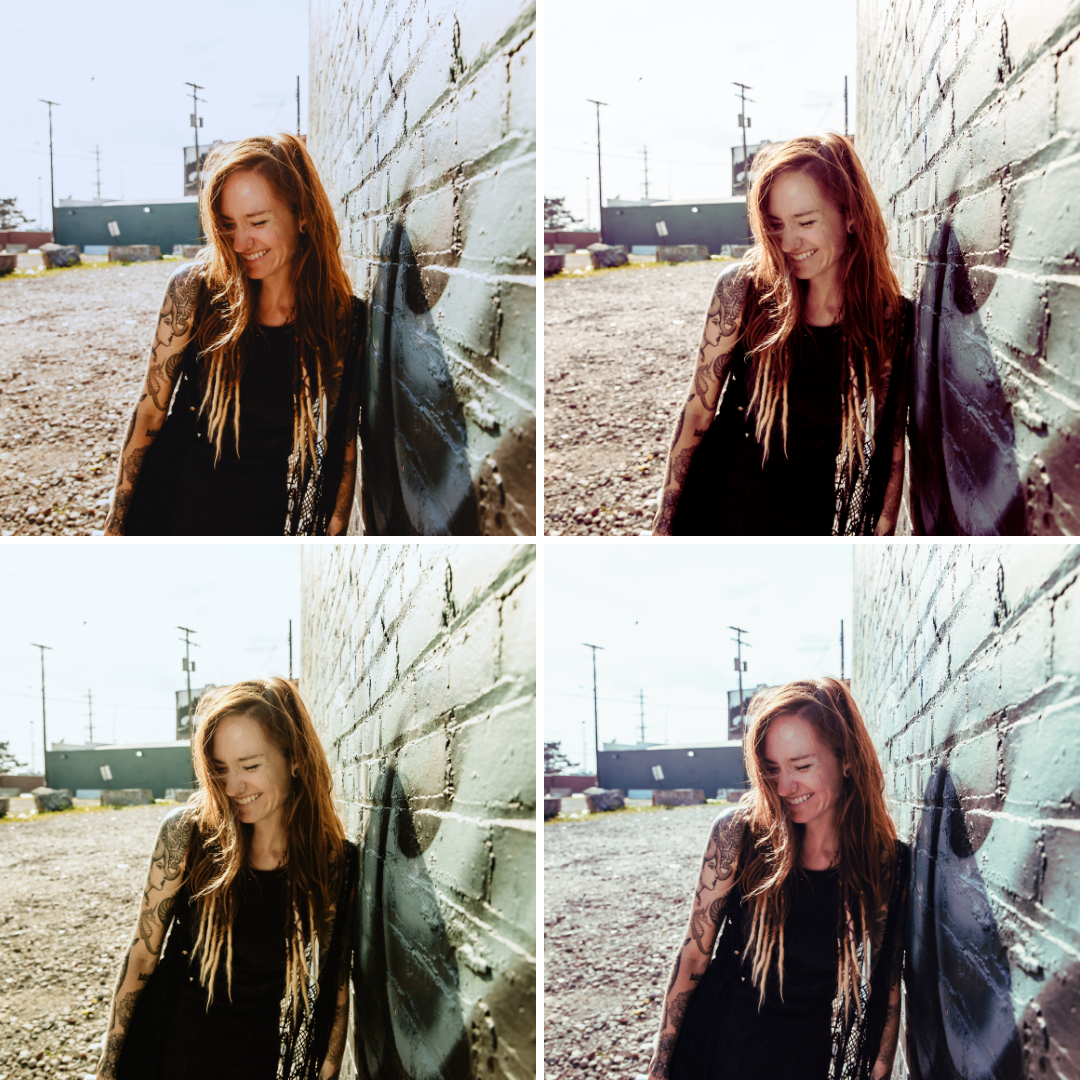the four selves
Or as I call them - the Four Jess’s.
I came up with this concept deep in meditation and reflection with the BioCybernaut Institute in Sedona. Here, they measure your brain waves and teach you how to get into alpha state in order to do deep internal work on your subconscious; you can access deep subconscious healing with forgiveness and compassion through finding truths, previously hidden.
Until you make the unconscious conscious, it will direct your life and you will call it fate.
- Dr. Carl Jung
Something that we all know - forgiveness can be really hard. In my time of reflection and solitude in a dark room in Sedona - it occurred to me why forgiveness can be so difficult.
The answer I found is: because we are made up of different versions of ourself - so there are different people inside you that have to be in agreement in order to give permission to fully forgive.
Now, I’ve already written some blogs on forgiveness - you can find one here. However, this is a brand new concept, an evolved method of forgiveness, if you will.
Say you were hurt when you were really small, which may have made you sad, or feel powerless or hopeless.
Perhaps you were angry and vengeful as a teenager.
Now, because some time has passed, you can look back on it logically without getting too triggered (although you still might get a little triggered.) Compassionate thoughts like “they were doing their best with the information they had,” may float around in your awareness.
Perhaps in 40 years you can look back on it and be completely at peace with it.
These are the Four Selves - these selves not only have to feel the feelings, but have to allow external expression of them in order to approve Full Forgiveness. Let me explain:
The little self
The little self is most likely the one that got hurt. How you got hurt will vary from person to person. Maybe you weren’t physically cared for, maybe you weren’t emotionally cared for, maybe you weren’t mentally cared for, and maybe your life circumstances didn’t provide safety or stability to feel cared for.
This makes the Little Self sad; feelings of despair arise, feelings of ‘I’m not worthy,’ ‘I’m not loveable,’ will come up here. Feelings of ‘I’m unsafe,’ ‘I don’t belong,’ can arise here. Feelings of shame can arise here because ‘If I was good enough this wouldn’t have happened to me.’
Sound familiar?
There can be no forgiveness without acknowledging and fully feeling the emotions.
Why?
Because your heart and your head have two different consciousnesses. Logically reasoning something in your head doesn’t access your emotions or allow you to feel in your heart, and forgiveness is a feeling, not a thought.
Let’s allow the little self to be sad, to cry, to yell, to sob, to despair, to deeply feel the feelings of sadness, AND to allow those feelings to become unstuck in our body and be expressed.
So, we emote and express the emotion; after all emotions are energy in motion, and we feel things to heal them. This is the opposite of shoving things down, compartmentalizing, and ‘I’ll deal with that later,’ mindsets. We are pulling these emotions out of being stuck in our body to be processed, live their entire life span (beginning, climax, resolution) and therefore actualized and finally released.
the teenage self
Because the Little Self cannot protect itself, our Teenage Self avenges the Little Self. It has to, because now, it can! The Teenage Self is smarter, bigger and physically stronger than the Little Self. The Teenage Self has access to more resources, coping skills, concepts, wisdom, friends, therapists, counselors.
So, outwardly - we might rebel, we might steal, smoke, drink, yell; or inwardly - we get depressed and implode on ourselves, self harm, become introverted, stay away from people, isolate, maybe we take things personally, or out on other people.
This of course will look different to different people. The way we react will always vary based on our environment and personality.
The idea here is the Teenage Self is now protecting the Little Self, and it will do it anyway it can.
So what do we do?
Once again, we allow the emotions. We allow ourselves to fully feel the hatred, resentment, and betrayal. We allow ourselves to feel these emotions as we felt them as a teenager and once again we express them.
To help process this rage we might hit a pillow with a baseball bat, find our nearest Rage Room, listen to angry music to allow the fullest expression of these emotions. We might write letters we never send to those who have harmed them.*
This is cathartic for the Teenage Self.
the current self
Now we are older and wiser, and have the ability to intellectualize concepts: ‘My dad was this way because his dad was this way.’ ‘My parents did the best they could with the resources they had.’ ‘Therapy was taboo when my parents grew up.’ These are enlightening realizations, no doubt, but it still does nothing for our Little Self that was deeply injured and couldn’t protect itself and our Teenage Self that needs someone to answer for the crimes committed against the Little Self.
Time has given us space to heal, but if we don’t allow our Little Self to cry, and our Teenage Self to rage, and both to express this outwardly, the process is incomplete. Mentally understanding an emotional concept does nothing because it’s not on the same wavelength nor does it speak the same language.
Here we must accept the feelings and allow our Little Self and Teenage self to express these emotions without judgment. To allow yourself to hit rock bottom, to fall in a puddle sobbing or howl at the moon.
Now, some of us do not feel like we have certain emotions, or that certain emotions don’t have an affect on them. I’ve met a lot of people who claim they never get angry and yet have uncontrollable sugar addictions. I find whatever emotion you definitely don’t think is a problem - is definitley a problem - and in dialogue with it you can find fertile soil for self inquiry and evolution.
If you have trouble accessing these emotions try my concept on Emotion Hacking:
If you can’t access sadness - try watching a sad movie about a dog, trust me you’ll cry.
If you can’t access anger - try listening to the angry or angsty music you loved in high school.
If you can’t access those old feelings - get a sound healing session with me and we’ll bring them right up to the surface to work on them.
The point of Emotion Hacking is sometimes we have trouble accessing certain emotions, this is normal, so we use an external stimulus (a sad movie or angry music) to pull up resonance in our internal space.
the old self
The Old Self is wise, the Old Self has lived so long and seen everything you have grown through. The Old Self is the version of you who has allowed the Little Self to cry, the Teenage Self to yell, and the Current Self to heal by feeling and responsibly expressing.*
The Old Self is who you needed when you were younger. The Old Self has compassion for all Selves AND all the people involved in the circumstances that resulted in injury. This is because the Old Self is all of your expressions of self and also has a grander perspective having transcended the stormy seas of your youth, your pain and your suffering.
This next part is a Thought Experiment so try this on like you were trying on a T-shirt - if it fits keep it, and if it doesn’t take it off:
Quantum Physics says that the present moment, right now, is the only thing that is technically real. So if we access all Four Selves in the present moment we are Little, Teenage, Current and Old together, united - therefore by feeling all the emotions and allowing the physical expression of those emotions we can find forgiveness because we've received permission from all the Four Selves, because we’ve allowed them to feel, to express, and to be witnessed by all other Selves.
Here we can release the binds and emotions that hold us captive to these past harmful circumstances or people - in this spaciousness of acceptance and surrender, through feeling and healthy expression, and then letting go of expectation.
feel the feelings and then rest in the spaciousness
Once you allow yourself to feel all the feelings you might find there is a sensation of spaciousness, of lightness and freedom. You might have more compassion and true forgiveness because you didn’t try to gloss over your own pain. In accepting our pain and dialoguing with it we deepen our understanding of ourselves, and therefore others.
When we forgive ourselves we can more easily forgive others, when we allow our emotional expression we can sit easier with the emotional expression of others.
~
Try it on and let me know what you think!
~
Out beyond ideas of wrongdoing and rightdoing there is a field. I’ll meet you there.”
—Rumi
*Expressing responsibly is important and an internal journey. You don’t have to do it alone and can have a vulnerability buddy. You are allowed to feel angry; just make sure you are being emotionally responsible by not blaming or yelling at others. You are allowed to hit a pillow with a baseball bat - that does not affect anyone else negatively. This is about YOU and your feelings.
paradigm shifts
When clients write to me for a session some of them say 1. I have a lot of trauma to work through and I want to get better and others say 2. I don’t have a lot of trauma, but I still want to get better. My response is always - “trauma” is relative - what is traumatizing to me might not be for you and vice versa. So, there is no need to judge what you perceive as trauma. If something happened to you and it bothered you, but someone else ‘went through something much worse,’ it’s still okay to not be okay with what you went through!
Spiritual bypassing is a term used to define when one’s belief system allows them to ignore or avoid personal issues or facing certain things. For example, if something particularly traumatizing happened to them, instead of processing with friends, working it out, journaling, crying, getting therapy, getting angry (all healthy reactions) they ‘jump’ straight to forgiveness. Now, of course forgiveness is a great thing, HOWEVER, you are a human being with complex thoughts and emotions and it is only natural to go through an entire process to e v e n t u a l l y arrive at forgiveness. Remember it is okay to not be okay, don’t gaslight (lie to) yourself by pretending to be okay when you’re not. That only hurts you in the long run because it delays the healing process.
I try not to speak in absolutes, but I do believe in order to heal something, you must feel it. Feeling pain, talking about your pain, accepting your pain and your process helps the pain to be witnessed and seen. In that exchange of witnessing and surrendering to what you’re experiencing in the present can help it evolve and change. Like the book written by Paulo Coelho, we ARE the Alchemist, turning the things that have happened to us into gold for others. Sometimes I wonder if the ‘bad things’ that happened to me were actually FOR ME - transforming me into a talented tuner!
It is in dialogue with pain that many beautiful things acquire their value. ~ Alain de Bottom
In Biofield Tuning we have a term called “puddling.” Puddling is when we completely and unabashedly allow ourselves to break down, withholding judgement. I remember one time I was supposed to pick up Eileen at the San Diego airport but my boyfriend and I had just broken up and I was in the middle of a good puddle session; I told her what was going on and she excitedly said “Puddle Away!” and I did.
I allowed myself to fully feel the darkness and sadness of what I was experiencing, without shaming myself or my compartmentalizing my emotions and shoving my feelings down. Because of this I was able to go through my process faster, heal quicker and feel more grounded only after a couple weeks - rather than several months! People talk about rock bottom like it’s a bad thing - but I believe that falling without end is worse. Rock bottom is when you finally stop and have an opportunity to stand up again.
In reference to what I find in the field - I prefer to call these situations Paradigm Shifts. They’re not necessarily traumas and it seems incorrect to call them that. Sometimes in childhood I find the birth of a sibling, or in the teenage years perhaps there was a move of houses, schools or even a parent getting a new job. These are not traumas if you enjoyed all of these events! However! They are Paradigm Shifts - life was one way, linear, and now everything moving forward is completely different than it was the day before. Paradigm Shifts are neither good nor bad, they just are.
Because of the self-help work I’ve done on myself since my teenage years, my understanding of the biofield and emotions, and my perspective of the world, when something goes wrong I like to think it happened “in order to strengthen the plot,” of my story. This is to acknowledge what has happened and to also bring some sarcasm and levity to the situation. If you’ve had sessions with me you know I like to invite humor in! I agree that laughter is (one of) the best medicine(s)!
It’s dark because you are trying too hard.
Lightly child, lightly. Learn to do everything lightly.
Yes, feel lightly even though you’re feeling deeply.
Just lightly let things happen and lightly cope with them.
I was so preposterously serious in those days, such a humorless little prig.
Lightly, lightly – it’s the best advice ever given me.
When it comes to dying even. Nothing ponderous, or portentous, or emphatic.
No rhetoric, no tremolos, no self conscious persona putting on its celebrated imitation of christ or Little Nell.
And of course, no theology, no metaphysics.
Just the fact of dying and the fact of the clear light.
So throw away your baggage and go forward.
There are quicksands all about you, sucking at your feet, trying to suck you down into fear and self-pity and despair.
That’s why you must walk so lightly.
Lightly my darling, on tiptoes and no luggage, not even a sponge bag, completely unencumbered.”
~ Aldous Huxley
Healing isn’t about fixing everything that is wrong with you, it’s about accepting and loving yourself anyways. Regardless of what you went through, regardless of how you handled it, what matters is …
have you grown through what you’ve gone through.








